M: Hey Tony, hello there. So is this the first issue of RT you did in 76?
D: Yeah, it’s the first one. Nov 76, it came out.
M: In Nov 76. So what… what made you do this? I mean, you obviously… How old were you in 1976, if you don’t me asking?
D: I was about 17 then, 17 or 18
M: What year were you born?
D: 1958
M: So was I. What month?
D: April
M: July – so you’re the old man here…
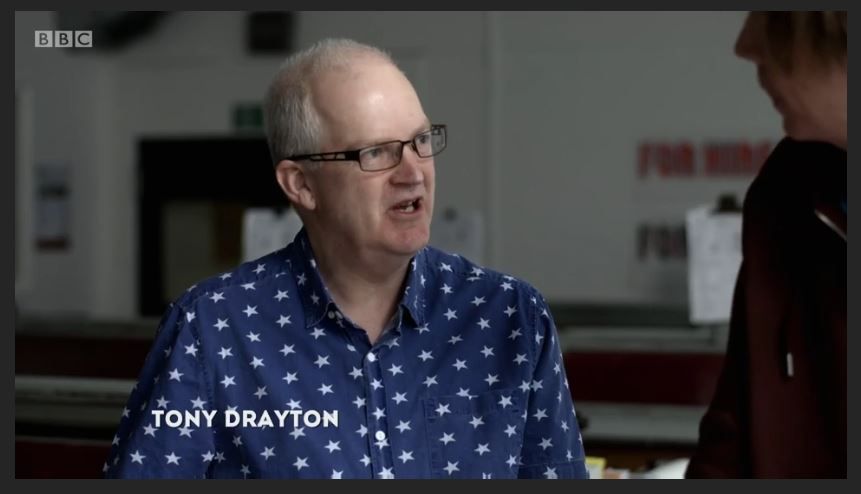
D: So what used to happen – I was living in Glasgow, reading the music press and avidly following music and they started writing about this punk rock experience. Punk rock’s happening in London. And I thought this sounds like my kind of thing and I’d get a bus from Glasgow – there’s a bus at 11 o clock on Friday night. I’d get back Monday morning to Glasgow at 8 o clock in the morning. I’d often be on the bus, leave work, leave the work I was doing, go to London, come back on the bus, go straight into work in the morning, having seen punk rock bands and what was happening on King’s Road, not what was happening compared to later on, but there was enough people hanging around in shabby clothes, with funny haircuts. I thought this was it.
M: And were you by yourself? Did you have a mate that you…?
D: A mate back in London, but he never got into this idea of going down and back. So I’d go down by myself, stay at people’s houses …
M: Do you remember the first bands that you had seen in 76?
D: I’m trying to remember if the Damned is the first time I actually saw a band in 76 – I’d go down there, but there weren’t any playing. I’d just go down there just to see what was going on.
M: Yeah.
D: Because London is a bigger place than you realise. Before you go to London, it’s this giant city.
M: Were you aware of Rough Trade which opened in 1976.
D: Yeah, they used to have stalls at gigs again – I found out at the Damned gig, they had a stall there. Again you’d go there; they didn’t have that much stuff. Rock and Roll off Carnaby Street was more a place to go – they had more Stooges, more punk garage selection. I remember going there and Metallic KO and Nuggets, and things like that…
M: To start a fanzine – was there any other fanzine that you saw at the time? That would have existed?
D: I suppose there was Sniffing Glue
M: That was the one?
D: And I found that on Kings Road, which again I’d read about that in the papers, the music papers – I knew it existed. I got hold of it and thought this is it – it doesn’t look very good. It’s just this columns, not much graphic style going on, and then when I met at the Damned gig, I met Mark, said to him ‘ Can I write about, can I write for Sniffin Glue’ cause I loved writing, as long as, the only thing I was good at at school was writing. I said to him ‘Can I write about this – I’m down from Glasgow – Down fro’ Glasgae – Cannae wrigh bout the Damned’ and he said ‘No, do one yourself, go back to Glasgow, and do one yourself’.
M: So you did!
D: And so I spoke to the band – cause the Damned at that stage went into the bar and said ‘I’m down from Glasgae tae see ye’ and went back and put it together really quickly, put it together with my mate, Skid Kid – I mean seeing the actual Damned, it blew my mind. Everything I thought was happening with Punk Rock… It was actually better. The reality of seeing the Damned, it was better than I could possibly imagine. So fast, I never believed the songs could actually be so fast – hypnotic almost. And so this was my kind of… I gotta do something, that was my reaction to this. All I can do is write, I can’t sing, I can’t play guitar. All I can do is write. And so I put this together.
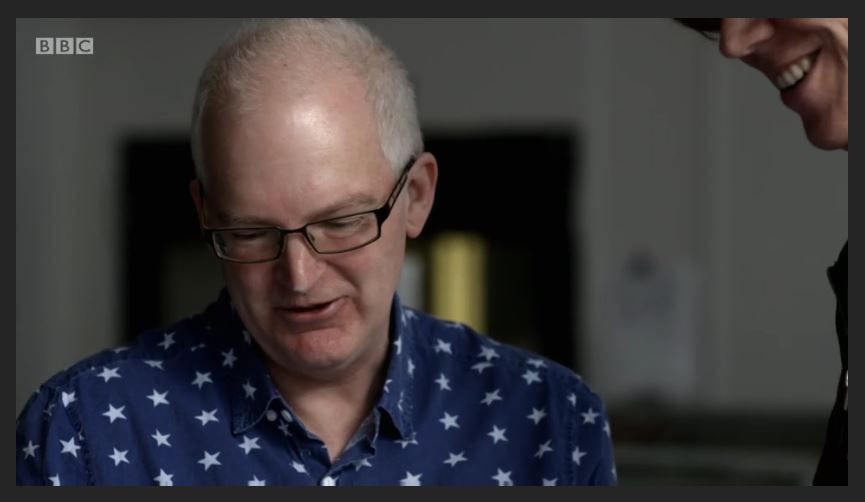
M: Can Rich Stars Rock? (TM reads article)… That’s Rock and Roll
D: It’s poetry – pure poetry.
M: Were you, eh, so how much did you charge for this when you did this? So this is Nov 1976…
D: There’s no actual price for this. I didn’t know what to charge. Let me tell you a little bit of the backstory – when I did go back and created ten pages, there’s ten pages here. At the work, I managed to photocopy ten copies of each page, so I’d ten issues. I’d ten copies of it stapled together. What was I going to do with it? I think, almost in a sense that was it. I’d done ten issues, I was fine, I was replete, and my creative impulses were done. I’d sent a copy to Rough Trade and a copy to Compendium Record, bookshop in the days when people used to write. Rough Trade wrote back to me and said ‘Great, can we order 200 copies’ and the next day Compendium wrote to say ‘Great, can we have 200 copies’ and I would have had to photocopy 400 copies, that’s 4000 on this work photocopier, and I thought I can’t do that.
M: Stapling alone is a kind of…
D: But I managed to… it’s leapt to another level. So I had an order 400 copies, and again I hadn’t put a price on it at that point. They said How much are you charging for it – and so I think I only charged 20p or 25p, and I said it to the shops they’d buy it for 15p and then sell it for 20p, 25p, and then I had to go to another printer, and the level just rose suddenly, who said he could print it and he did. And I had to sit and staple it all, and post these bundles down to London.
M: One sided, what size?
D: A4
M: A4? Sorry, I’m an American, we don’t all these sizes – it’s 11 x 14. Those are our two standard sizes, so the A7, A4 thing is like… it’s like Fahrenheit and Celsius. Yeah, I’ll give you 50p for this one!
D: I think they go for hundreds of pounds now…
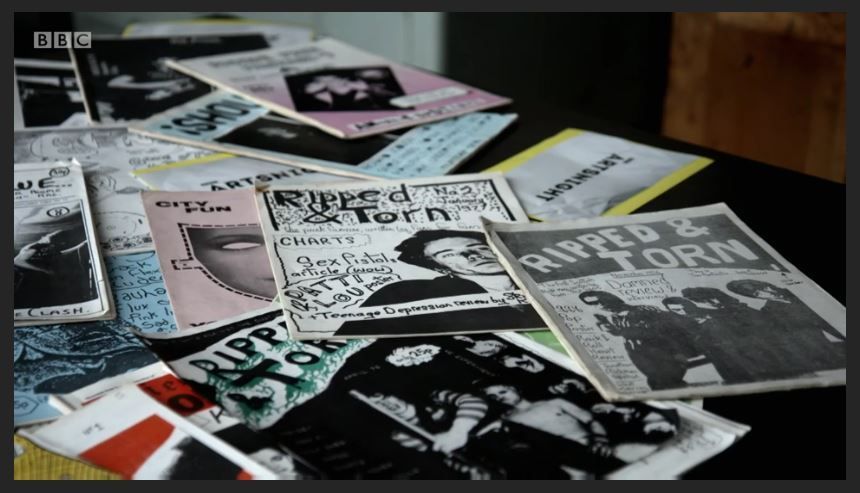
M: Well, all of these fanzines we have here – do you have recognise some of these? Were you a fanzine collector at all?
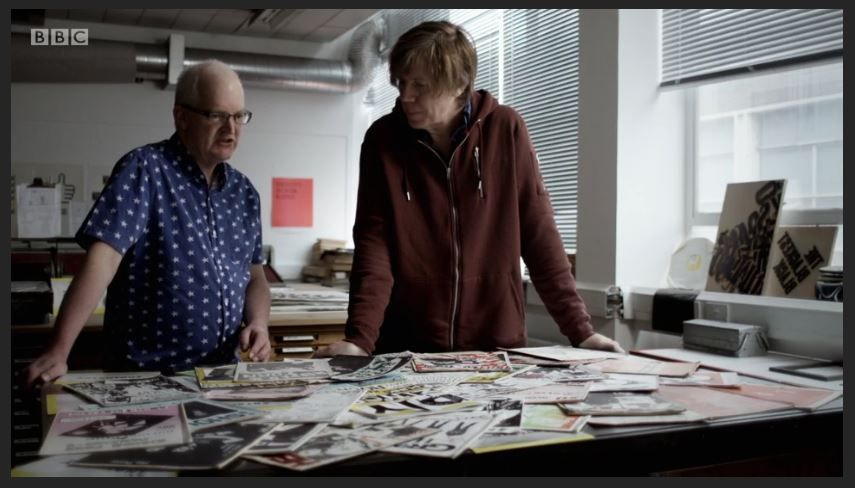
D: I do, yeah. People used to swop – you’d do a fanzine, you’d swop fanzines. Everyone would be at a gig, by the… a bit later on, you’d have seven or eight people at gigs. And everyone used to swop… You’d go back with more than you’d turn up with…
M: I recall… ‘Cause fanzines would always have addresses of other fanzines in their fanzines, so you’d…
D: Once you got one, you could find more….
M: You’d throw a note inside the letter and hopefully a fanzine would come. Usually it would…
D: I… what I used to get is requests to buy records. People would write to me, saying can you buy me this?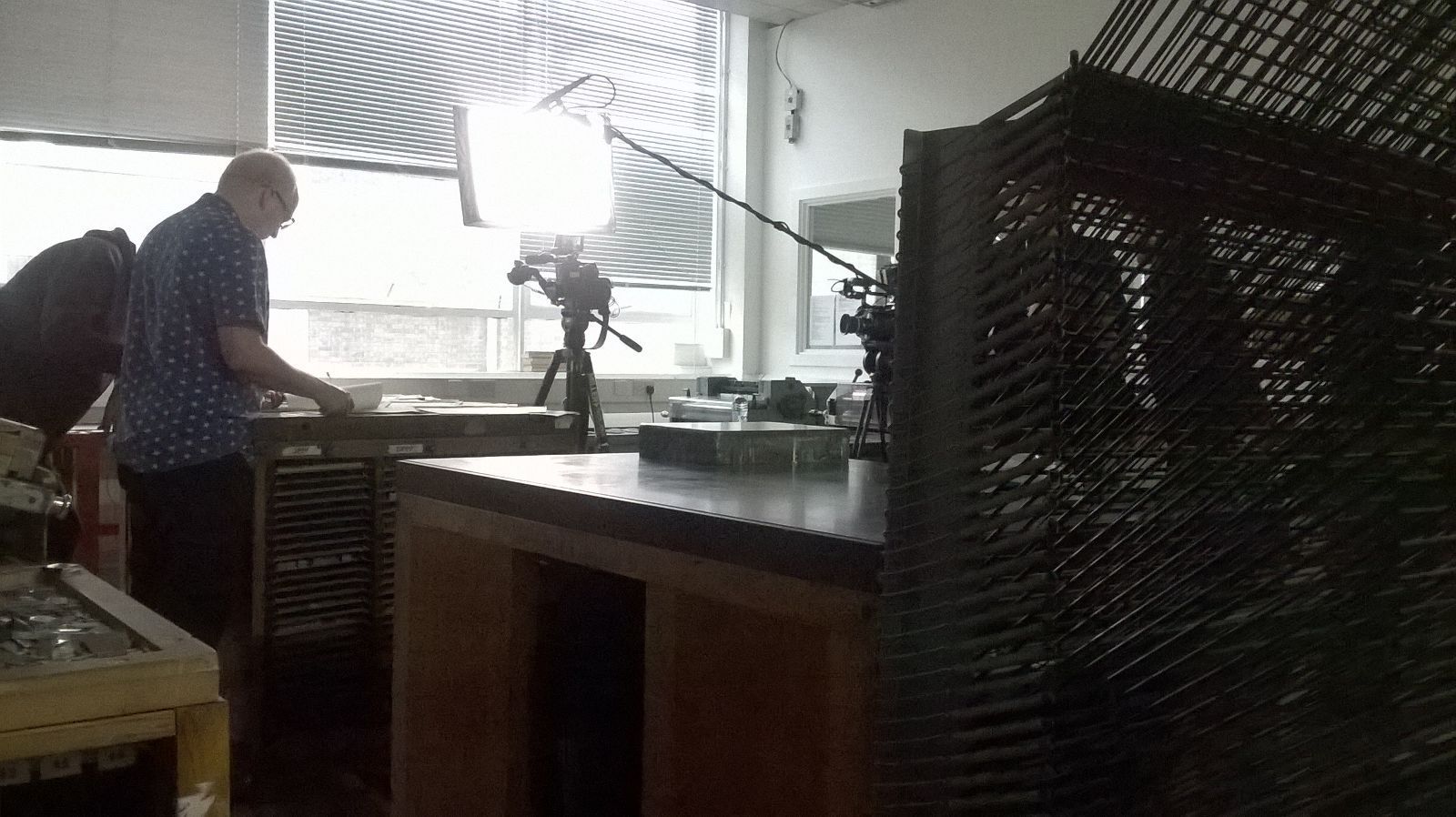
INTERRUPTION
M: How many copies of RT did you make?
D: I made 17 in the end, and then I passed it on to lady called Vermillion. She did the 18th. I moved on. I went abroad, and she was… the idea was that she was going to carry on through. There were 17 at that point. And it grew quite dramatically, graphic wise and design wise, probably writing wise, the bit you read out. The bit with less swearing in it.
M: A bit less swearing.
D: Sentences probably got longer as well. So, we moved from A4 single sided to A3 – we started having A3, started having colour on the cover. And you see more… more inventive lay-out style. Of course there are more bands to write about, so a new world was coming up. New bands discovering things. It got quite big towards the end; it was quite a big seller. Quite good alternative to the music press. As I was saying about it to somebody… when the music press was saying that punk rock’s dead, the music press was saying that punk rock was over, they certainly went on a whole music press agenda that punk rock… So fanzines became really important, because they’re the only ones writing about, because we never questioned whether punk rock was dead or not, we just knew it was alive, just write about the bands as we were doing in 77, 76. And so it then became important… A lot of it was much localised as well in different cities, writing about their local bands.
M: Did you ever think that you’d want to be in a band? Did you ever have any aspiration to have a punk band? As much as you love punk…?
D: If I would have had a band, a band round about the David Bowie era, when I first got into music, roundabout 72, 73, when I was listening to the Stooges, the Velvets, started… then you’re hearing that stuff. You don’t have to be an accomplished guitarist to play… I just couldn’t fathom it. I think I tried. I got an acoustic guitar… And I can’t sing, even to punk rock standards – I haven’t got the strength of lungs for it. I admire, I really admire people…
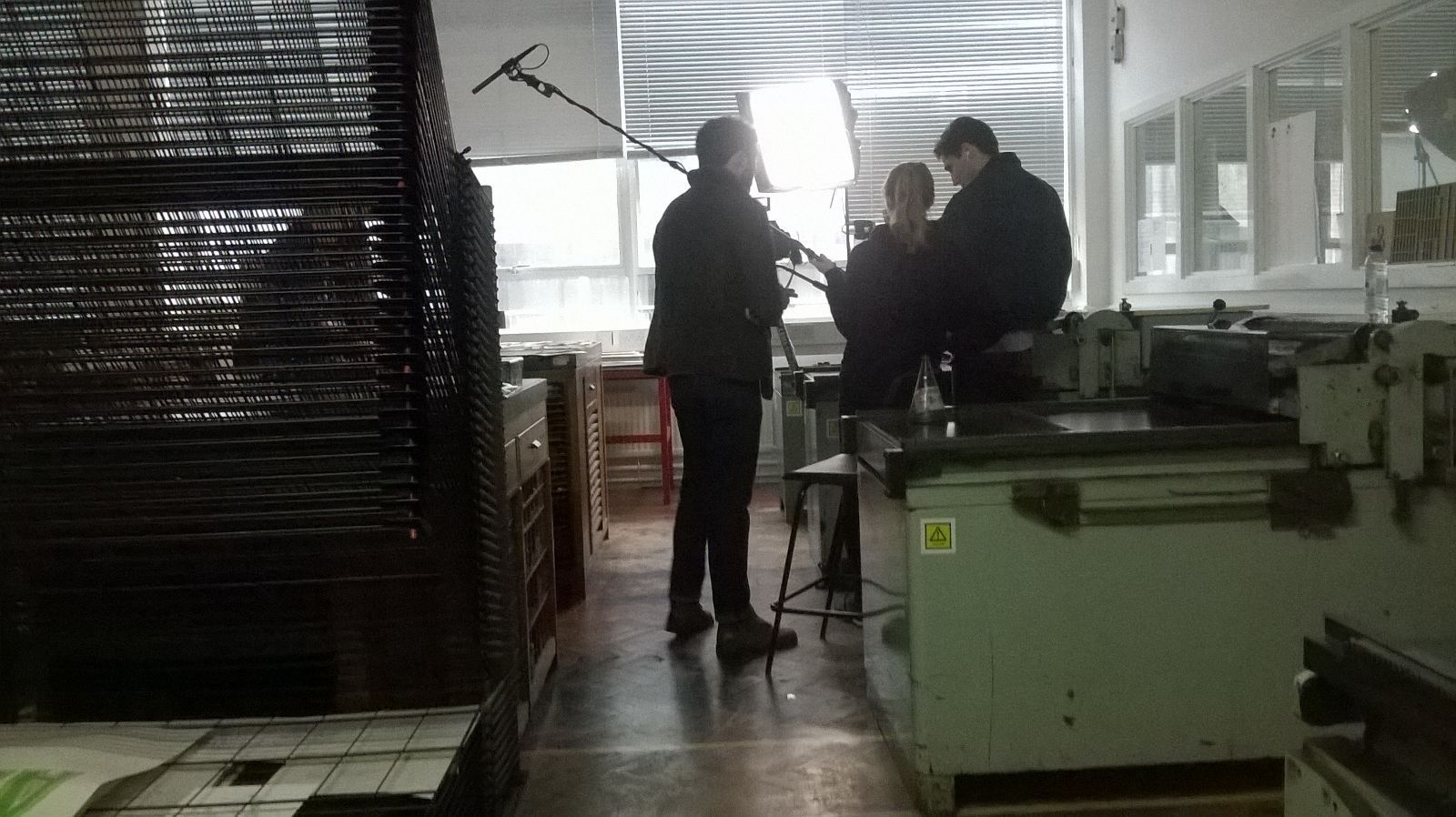
INTERRUPTION
D: I was very good at writing in school, my only skill was writing. So it was natural for me to think this was the way I was going to go. If I had formed a band, it would have been before punk rock, and unfortunately it didn’t happen. Also I didn’t know enough people who liked that type of music…
M: Living in Glasgow in 1976, discovering punk rock in that community there, did you have other friends who also were where you were or did you feel pretty much that you were on the margins?
D: The ones who liked Mott the Hoople, liked Roxy Music, liked short songs, were ready, were primed for this style of music, this look. Those of my friends who liked Yes, Deep Purple, Emerson, Lake and Palmer, Led Zeppelin, Led Zeppelin was huge in Glasgow – those people just didn’t get it all, and thought it was pop, punk… I remember playing Anarchy in the UK to some people and they said it’s just glam rock. And I thought, that’s probably why I like it.
M: I think in 76, a lot of people probably felt, hearing the Ramones or the Sex Pistols, that it was an extension of glam, but with leather jackets, jeans, and so it still had this kind of high concept in a way, but it was more into this street rock thing, which in a way, maybe you saw it a bit with Slade, or even Mud or these kind of bands. There was something a bit ‘street’ about it. Maybe…
D: In England we had the Bay City Rollers, who had the short trousers and scarves. And that look was taken off football hooligans. The short trousers maybe flared up to the calf.
M: They weren’t singing about anarchy or sniffing glue or…
D: And the spiky hair they had…
M: Or smashing things up. The…
D: Saturday night’s quite raucous.
M: Definitely. It’s alright for fighting. But, those sentiments needed to get real. And there was a certain sort of, EM, reality in what was being sung in the punk bands in 76 that sort of attracted us.
D: What I found was that I was going down to London and coming back was that London seemed more like my home and going back on the Monday, I was entering an alien land. I was entering more and more sort of seeing sort of friends. It was more my neighbourhood as it were, they were my people. Everything back in Glasgow was just more and more alien and irrelevant. You know, I spent most of my time there, but I felt I was alive at that point.
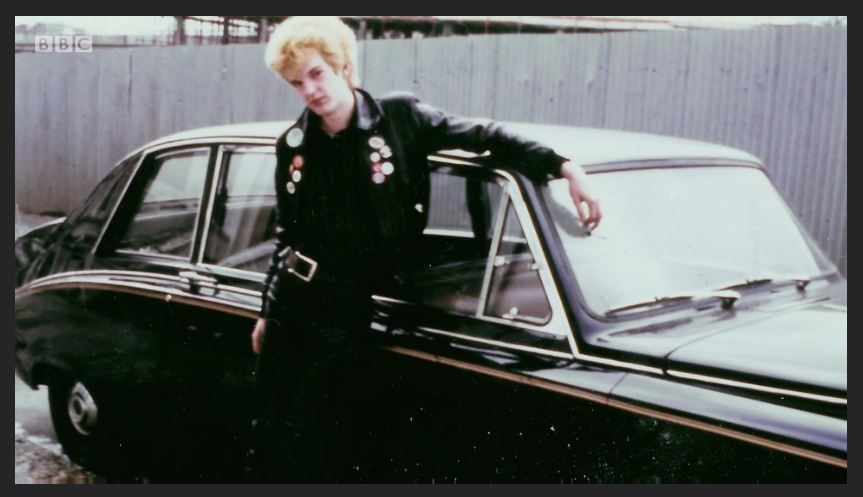
M: So you relocated to London at some point?
D: At some point. I was still working at my job; where I did issues number 1 to 4. And by number 4 I actually put Glasgow’s Only Fanzine and straight in Tony Moves to London full sordid details. So you can see its right at the cross over point.
M: Did you have any foresight at the time about what was going to happen after 76, cause 77 everything explodes. Records, fanzines, everything sort of comes out. And more and more people are just like joining the league of punk. Did you feel that happening or did you just think it was going to be like this weird little thing? Cause in 76 it was a little bit transitional in a way…
D: I thought it was going to be a weird little thing, a little sub cult. I never thought of this explosion. Of course, Bill Grundy… the interview changed everything overnight.
M: And did you watch that?
D: It wasn’t on in Scotland. But every local, every paper, all the red tops, called the tabloids had it front page. It used to have… A tiny small TV show with a small interview on it, completely out of proportion. Because punk had all this filth and fury – the Pistols that was set up, was mostly cancelled, all the dates were cancelled. And that’s how it changed from being a little subculture – it could have just been loads of bands playing around. Small little groups of punks in different cities suddenly became them. Certainly punk exploded, a lot of people became punks after that. But really the first reason for being a punk – they became punks more for Sid Vicious and the Dead Boys. So it’s a shock thing now, rather than a lifestyle, an alternative lifestyle. I saw it as a lifestyle – a breakout of a boring reality. And people saw it as a shock, which then they kind of thought Saturday night’s all right for punking. Cause you have then to go back – they’re quite happy to work, and then the release.
M: Were bands coming up to Glasgow – did the Pistols come up there?
D: Well, the Pistols were cancelled – In RT 2; I’ve got the ticket stub in.
M: Oh, you’ve got the ticket stub in RT 2?
D: It was cancelled, because that was almost three days after Bill Grundy. The tour had started, when the Grundy issue had happened.
M: Oh, so that must have been really upsetting for you.
D: Yeah, it was… And I told so many people this is it – this is it. This is what I’m talking about. This is what I do on the weekends. It’s coming to Glasgow. No, it’s not coming to Glasgow. Then the Damned came supporting T Rex shortly after that.
M: Cause Marc Bolan was really pro-punk rock.
D: Because he had his TV show and he got bands on TV. So he got the Damned on TV. It was the first band to play a big venue – I think any band really. I think the Vibrators came up; Iggy Pop I think stopped at Newcastle wouldn’t come upwards! So as far as I know, the Damned supporting T Rex was the first London punk band to play Glasgow. We had the Runaways. The Runaways played that summer.
M: Did you go to see that?
D: Of course! It was huge!
M: Was that with Cherie Curry or was that?
D: Cherie was still singing then. The first album had just come out. That was actually – it sounds ridiculous – but that was the first time we saw people were interested in punk. We had people like Alex Ferguson, Sandy Robertson, SR went on to write for Sounds, and Alex Ferguson went on to write for ATV and Psychic TV. I met these people at gigs like that. And they had friends who became Orange Juice, Postcard Records. The Jesus and Mary Chain, they were at that gig. So all these kind of people you never really saw. This was the first time there. And unfortunately there was nothing again to really bring that side…
M: Was there a record store in Glasgow that people could socialise in?
D: Not really. The shops were very good – there were these independent shops that sold all this stuff. And had Anarchy in the window – the Damned, New Rose – promoting this stuff.
M: Which place was?
D: I can’t remember the names of the record shops. There were three really good independent shops. So Glasgow was really lucky… But there’s no… You went in there and you wouldn’t see another punk hanging around. It wasn’t like Rough Trade sort of ambience. There wasn’t a pub you’d go to with them.
M: Do you have a complete run of RTs?
D: Apart from Issue 4 – we have a 4 here from the LCC. They’ve actually got one of the last copies of RT4…
M: How much for this?
D: I think they’re selling it… a three figure sum I think it is. It’s not 1999.
M: Yeah, we’re looking at this catalogue – it comes out of the Netherlands and France, there are two dealers. And it’s rife with, eh, punk fanzines from 76 onwards…
D: And prices…
M: Well prices are extraordinary. There’s nothing hardly below €300.
D: So what’s this table worth do you reckon?
M: This table, I would imagine this table would be worth about maybe between ten and twenty thousand pounds.
D: We’re rich!
M: We’re rich in fanzines. But the thing is that we don’t want to sell our fanzines because money is for squares. We’ll take the fanzines to our grave.
D: That’s my problem. That’s why I never made it.
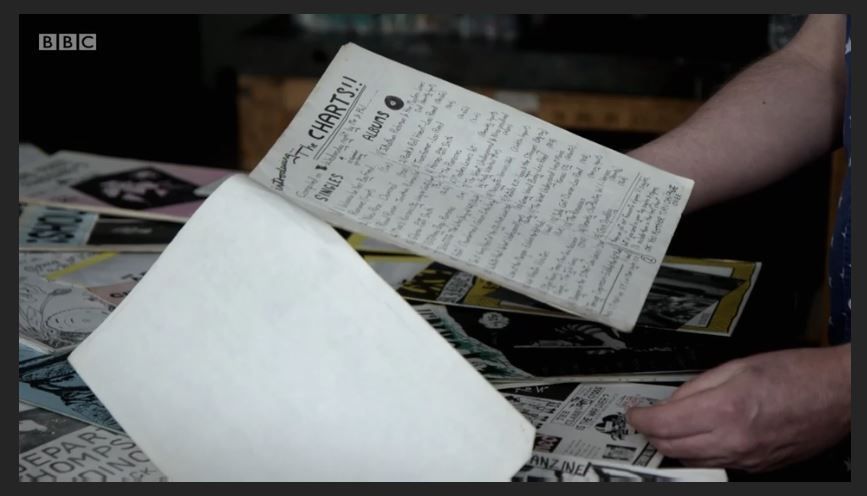
M: So in each of the RTs you had a chart which is not your chart, but is a chart from readers, they’d send in their favourite records.
D: That’s right. Send in your top ten favourite LPs and singles – a list of them. Not a list of them. If I’d been sent lists. I’d compile the charts – for RT1…
M: So RT1 must have just been you.
D: Me and the Skid Kid put it together. We had Ramones Number 1, Jonathan Richmond Modern Lovers album number 1.
M: And New Rose by Damned is number 2, eh. And did you own all these records? And how else would you hear them? Was much played on the radio at the time?
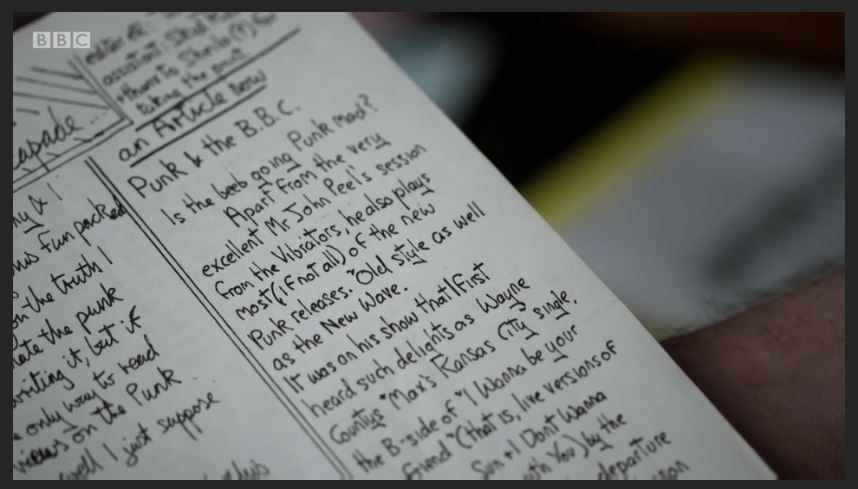
D: No, I think I put something in RT1 here about the BBC
M: The BBC? Did they have a clue?
D: John Peel did a sort of punk night one night. He took some stuff off Live at CBGBs, Kansas City…
M: That must have been pretty exciting to hear that.
D: It was a whole two hours I taped the whole show. I played that every day. And, em, I put on here ‘We Vibrate’ by the Vibrators was played on the Simon Bates show, which was a mainstream morning show.
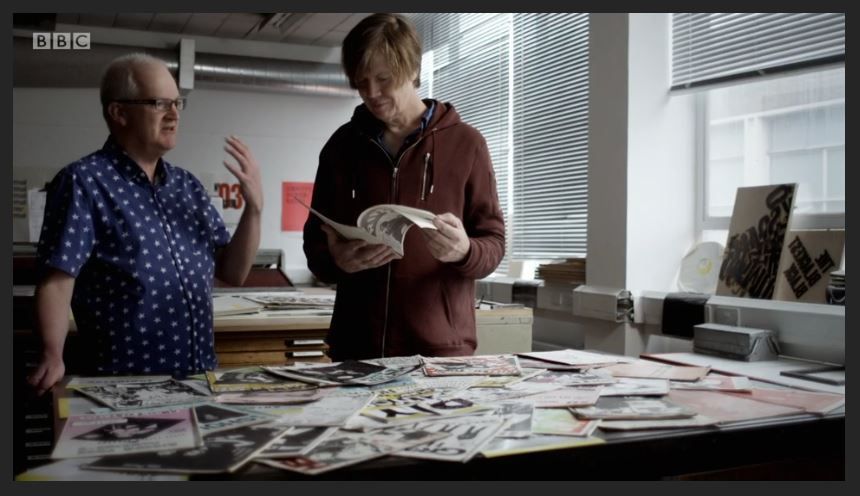
M: THURSTON READS ARTICLE. What do you think?! 2016 – forty years later, you’re actually on BBC Two, talking about 1976 punk rock.
D: Unbelievable. I wrote that, I would never have thought it possible.
M: Well maybe you should do a new issue of RT, to serve, maybe… I take it all back [laughs]
D: The director’s cut of this one. What it really meant, and what happened afterwards.
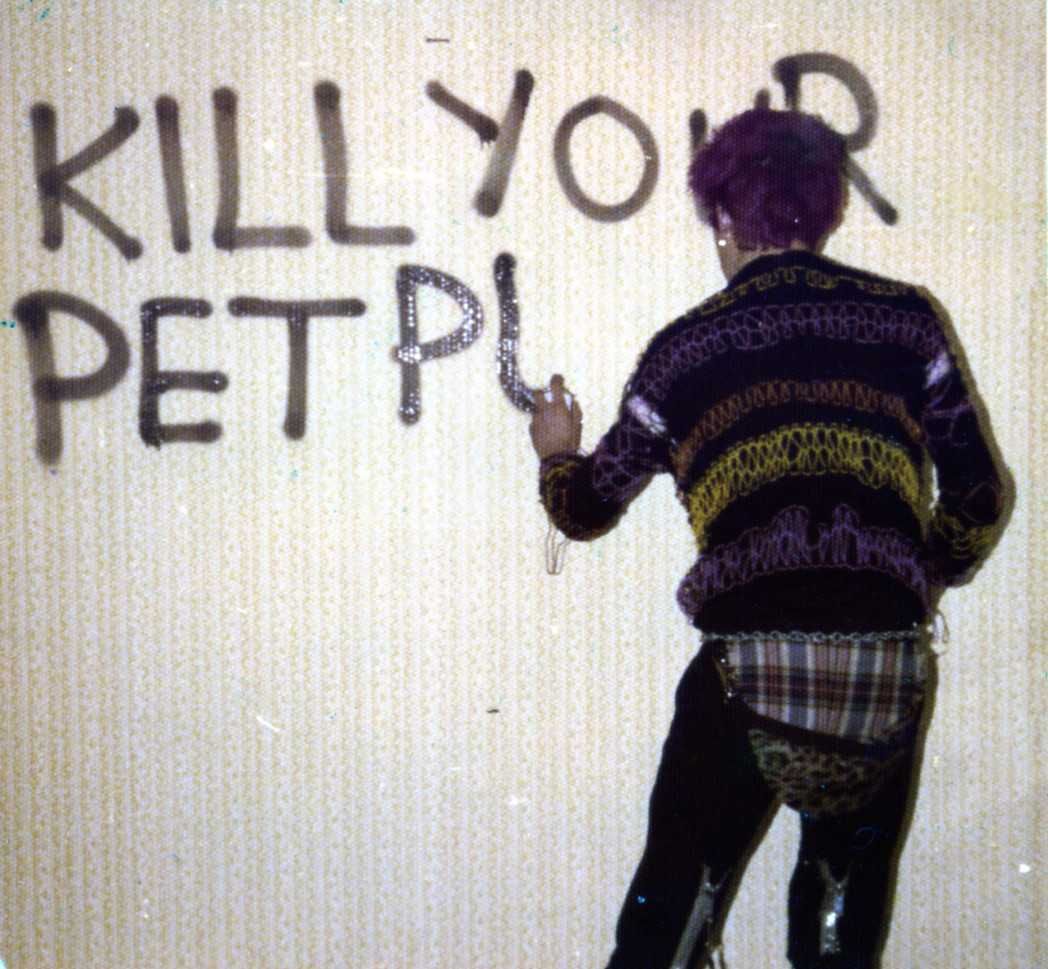
M: After RT you did KYPP.
D: Yeah, I moved on to KYPP.
M: In ’80, I think it was?
D: Dec 79 I think. So the last RT I did was April 79 and KYPP came out in… December…. It was sold at an Ants NYE gig. So…
M: So Vermillion continues RT and you have a whole new…
D: I wanted to try something different. I went in a different direction.
M: And what was the aesthetic difference in a way? It looks a bit more… I don’t know, kind of wilder or something.
D: Yeah, I think the printer Joly. He had some… he sort of approached me about doing something. He had some new printing presses. He wanted to try something to experiment with.
M: So Jolly at Better Badges was really important to fanzine culture in the 70s wasn’t he?
D: He was, certainly in the 80s, around all the country at gigs with his Better Badges stall, and then he’d go back to London and go to Rough Trade…
M: He had a presence at the RT store where he would help fanzines be printed and assembled…
D: Well, he was working at Better Badges up the road. On Portobello itself. RT is on Kensington Park Rd. So you’ve got badges made elsewhere. He could start to print A4 fanzines. And then you had this idea of doing colour on colour. He did a lot of flyers for gigs at this time. This style of rainbow printing, it became his look, his way of doing things. And so he used to print a lot of fanzines, cornering the market really.
M: Do you keep in touch with Jolly?
D: He’s moved to NYC.
M: Yeah, I would see him all the time in my NYC years. He’s great; he’s still setting up all these… Sells some badges at gigs. And he’d ask and he has this long hair and smoking spliff and selling badges. And he was fabulous in the sense that that’s what he does and he does it perfectly. But the fact that he lends his knowledge of craft to anybody who wants to do something, and do it themselves. So he’s kind of the DIY king.
D: He didn’t go back into printing then? Cause he does a lot of audio stuff, doesn’t he?
M: I think so.
D: A lot of events and conferences.
M: He does. He’s a great archivist. Of his own accord obviously.
D: He used to help people, fanzine writers. If you wanted some spare cash, you’d go around to his over a weekend and make badges. So that means you’d have to pull the thing down. All these punk rockers would be in his basement churning out badges for £20 or £5 a day. So if you were stuck for cash, you’d go down to his dungeon.
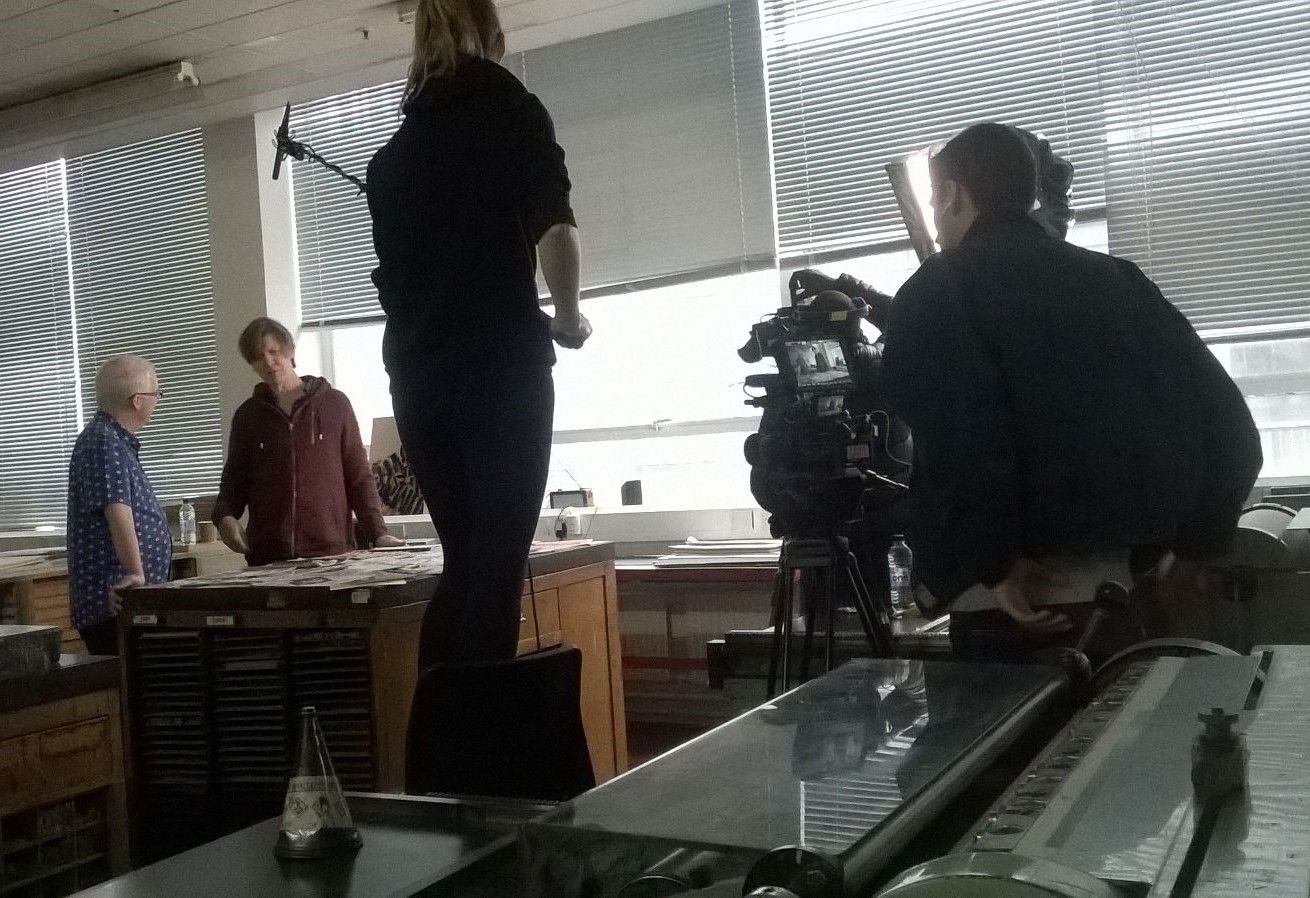
INTERRUPTION
M: So were you into pit punk? Were you at the front of gigs pogo-ing? Gobbing?
D: Not gobbing. I think gobbing was a bit of a myth.
M: Really? Sometimes I read a lot of interviews about fanzines where they just talk about being gobbed on and how it’s a bit of a bummer.
D: It may have been outside London, but I’ve never seen it. In London, I saw pogo-ing friends. It wasn’t violent… We used to call it chicken dance later, because people used to swing their elbows out to scare people off. But the actual pogoing, jumping up and down, I think that was a bit of a myth as well. We used to dance kicking their legs together like that.
M: Like skank dancing!
D: Yeah! That sort of space but a bit more militaristic if you like. Clearing a space. But…
M: So what made you…? Did you feel you’d been led out of punk, or did you feel like punk was changing into different things?
D: I think it developed. To me, I think punk never died, it’s evolved and things have come out. And sometimes you have old school punk band like Flowers and the Dustbin. So I’m going to see a band in a small venue. But I think it just developed – people developed their own worlds really.
M: Did you continue to follow a lot of the music like PiL and going into bands of that era, going into My Bloody Valentine, Nirvana, the 90s – what was your trajectory of music listening?
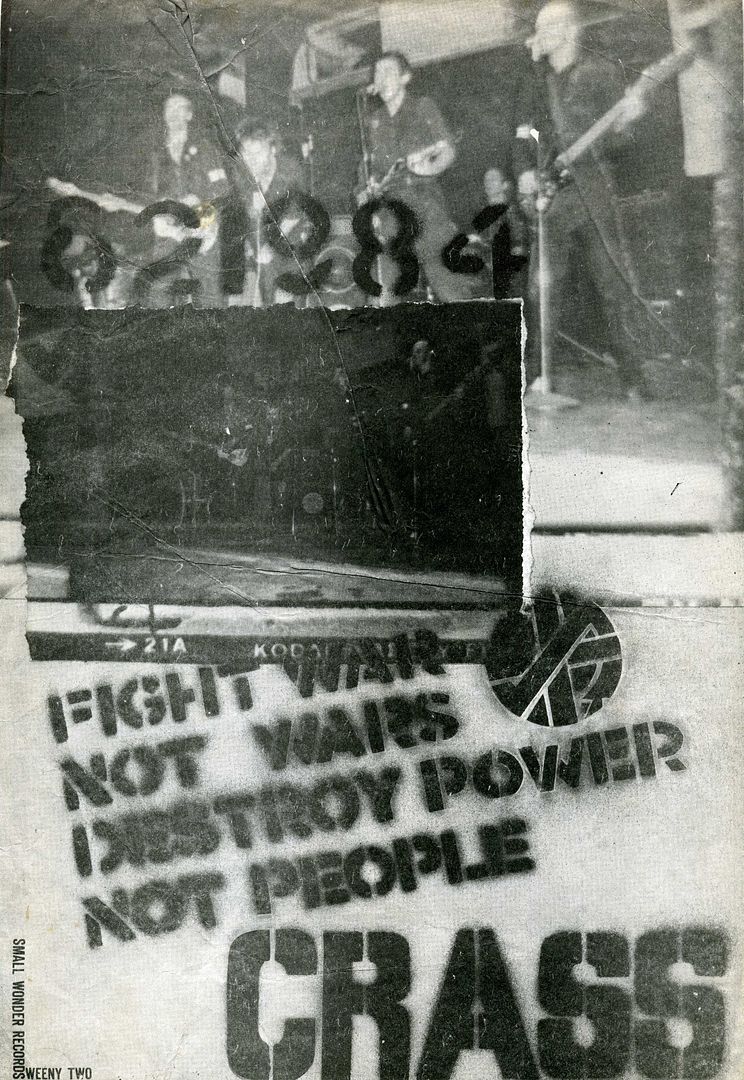
D: I call it my gestalt movement. When Crass appeared, 79 or 78 I first got the cassette. It was like this is what we were meant to be doing in the first place. I just got… This is it, and all the hard core anarchists writing and all the paraphernalia that went with Crass. It was a full on package of saying ‘In all your decadence people die’. Punk’s gone decadent – all the alternative lifestyle’s gone decadent. And that just like why – this is it. And Puppy and everything that came with it, after that is all there. Ants, Crass, Juno – that became the lifestyle. And the Ants at that point were still an unsigned band. Very very powerful music. But decadent. That’s the decadence, that’s the all your decadence people will die. So it’s combined – a lot of leather jackets would have Crass and Ants combined. There was no contradiction in liking both of them at all, which is all fanzine led information about them. And that became anarcho punk – and anarcho punk came out of that Crass chasm and ability to produce so much stuff. And quality stuff. After that, I think it became more interesting, all the psychobilly, and Goth stuff. All the Batcave stuff. Alien Sex Fiend. Taking the edges of the Ants world a bit further. On that side, I really liked the gun club, all that swampy, gothic, psychobilly stuff, and then you had the Crass stuff. My record collection… A bit like when new wave came out, and The Clash, Blondie, Pretenders, Elvis Costello.
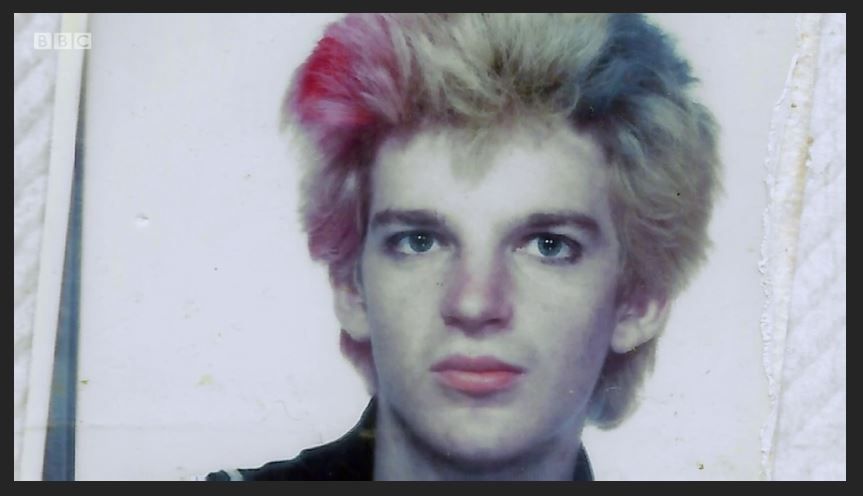
M: At some point you stop publishing KYPP and you go off into your life, whatever you do.
D: Do you want to know what happened after? We went into festivals. The Stonehenge festival and things like that were starting to become punk infiltrated. There was a band called the Mob from the West Country. They knew all the festivals, they played them all and introduced bands to play the festivals. Poison Girls played the festivals. We started going to them. And at the festivals, they started fire=breathing, juggling, the Tibetan-Ukrainian… LIFE STORY.
VIEW THE WHOLE B.B.C ARTSNIGHT PROGRAMME ON THE YOUTUBE POST HERE
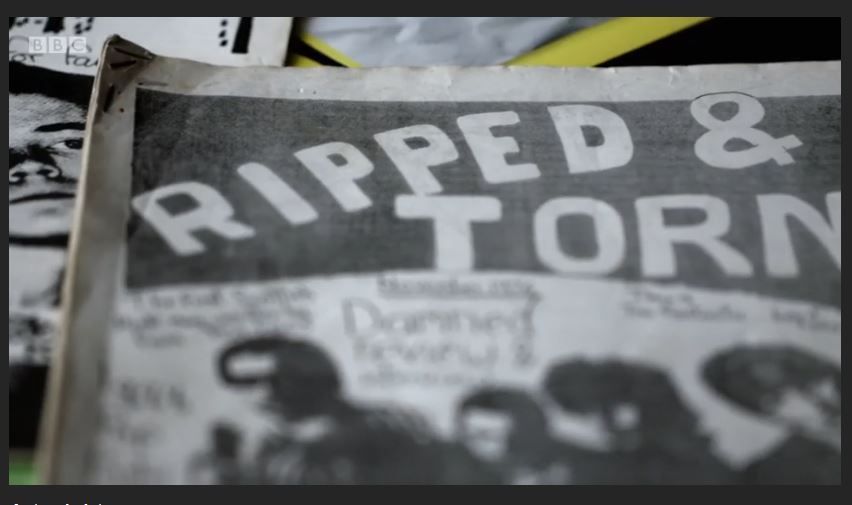
AL Puppy
March 19, 2016 at 9:37 amWonderful . Great to see/read and quite a breakthrough to get Ripped and Torn rather than Sniffin Glue featured as ‘the token fanzine’ in a programme about punk.
Val
March 19, 2016 at 10:28 amGreat stuff! Fantastic to read the transcript.
Martin
March 20, 2016 at 9:05 pmThanks so much for posting this.